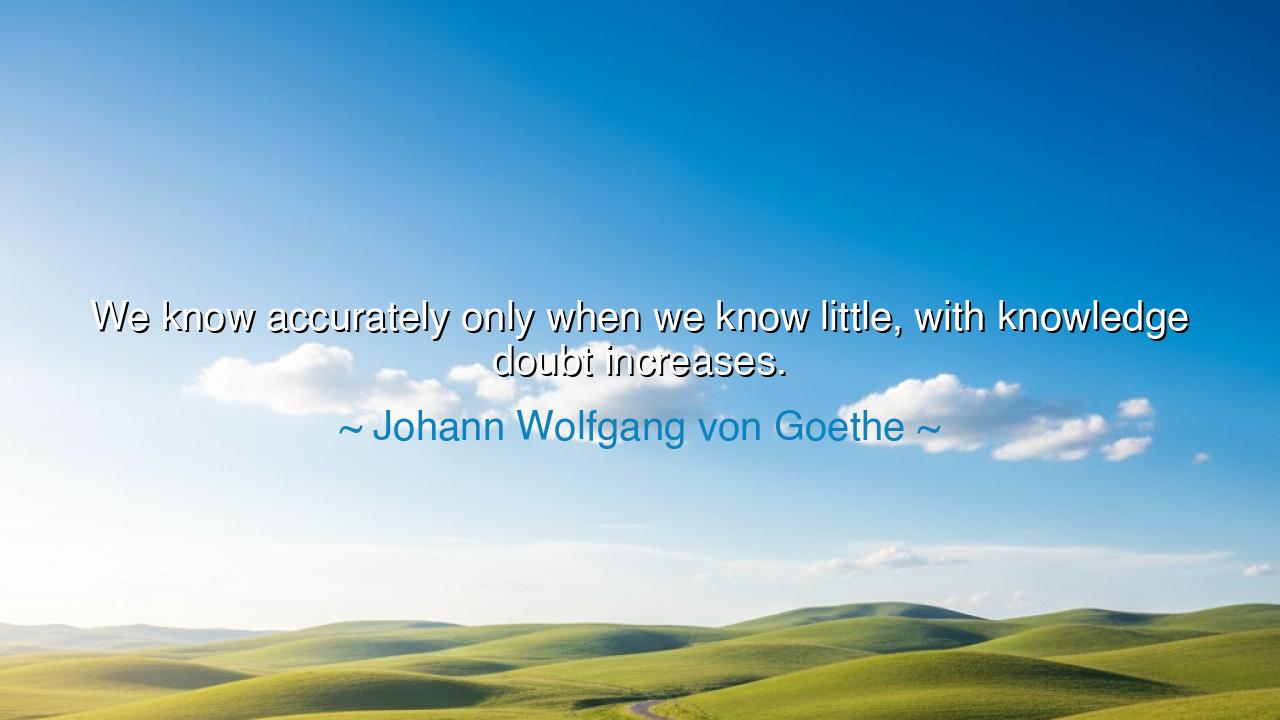
We know accurately only when we know little, with knowledge doubt






Hear the voice of Johann Wolfgang von Goethe, poet, philosopher, and seeker of truth, who declared: “We know accurately only when we know little, with knowledge doubt increases.” At first these words may seem strange, even contradictory. But in them lies a truth as deep as the sea and as sharp as the mountain wind. For when the mind is small and the vision narrow, certainty is easy. But when the soul begins to climb the heights of knowledge, when it peers farther and farther into the mysteries of creation, it discovers not only answers, but endless questions. And so, with greater knowledge comes greater doubt—not weakness, but humility before the vastness of truth.
The ancients also spoke of this paradox. Socrates, the sage of Athens, was called the wisest of men by the oracle at Delphi. Yet he claimed wisdom only in this: that he knew he did not know. The unlearned boasted of certainty, but the philosopher, who had journeyed deeper, recognized the infinite horizon of mystery. Goethe’s words echo this ancient wisdom: that certainty belongs to the narrow, but doubt belongs to the truly wise.
Consider the story of Christopher Columbus. In his day, many were content with the small map of the world they held. They thought they knew all there was—the edge of the ocean, the limits of land. Their knowledge seemed accurate, for it was small and bounded. But Columbus, daring to look further, discovered new lands and in doing so revealed how little was truly known. His voyage proved Goethe’s saying: when you know little, your knowledge seems exact; when you search deeply, you uncover the immensity of your ignorance.
So too in the realm of science. Newton, who revealed the laws of motion and gravity, saw further than most men. Yet even he confessed he felt like a child on the shore, collecting smooth pebbles while the great ocean of truth lay undiscovered before him. Later, Einstein would expand on Newton’s work, and in turn leave new questions unsolved. Each new step into knowledge broadened the vision, and with it came new doubt—a reminder that the universe is greater than any one mind can hold.
But let us not see doubt as despair. For in this teaching lies hope and courage. To doubt is to stay alive, to keep searching, to remain humble in the face of mystery. The fool says, “I know all,” and thus closes the door of learning. The wise says, “I do not yet know,” and thus remains a seeker all his life. Goethe calls us to embrace doubt not as failure, but as the very sign that we are moving forward into truth. Doubt is the torch that keeps us from stumbling in the dark arrogance of false certainty.
The meaning, then, is this: to know little is to be content with shallow waters; to know much is to feel the depths and tremble. Knowledge and doubt are companions, and together they lead us toward wisdom. The greater your vision, the more you will see of what remains hidden. The greater your learning, the more you will know how infinite the universe truly is. This is not a curse, but a gift, for it keeps the heart humble and the spirit ever curious.
The lesson for us all is clear: do not cling to false certainty. Rejoice when doubt arises, for it means you are growing. Cultivate humility; admit what you do not know. Seek truth not for pride, but for understanding. In daily life, question assumptions, explore beyond the surface, and welcome the mystery of the unknown. In this way, you will live not as one who is fooled by the illusion of perfect knowledge, but as one who walks in the true path of wisdom. For as Goethe has spoken, “with knowledge doubt increases”—and in that increase lies the glory of human growth.






AAdministratorAdministrator
Welcome, honored guests. Please leave a comment, we will respond soon